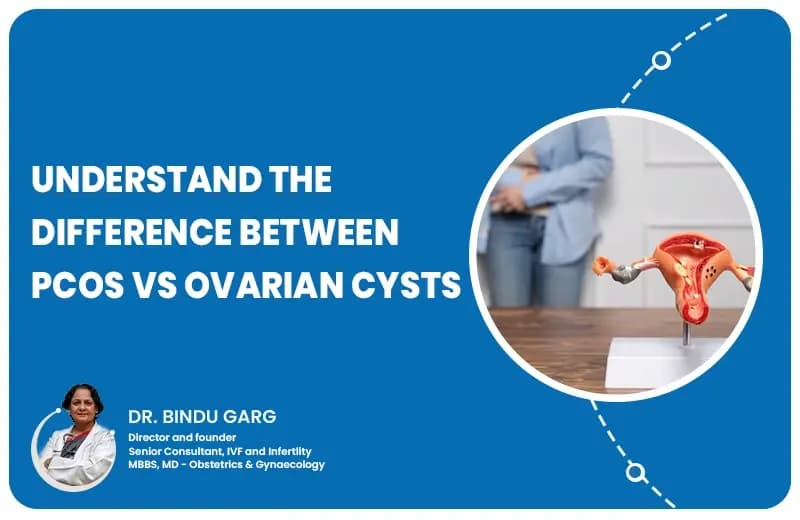
The Difference Between PCOS vs Ovarian Cysts
Polycystic ovary syndrome (PCOS) and ovarian cysts are two terms that are often confused with each other, but they are not the same. In this blog, we will learn the differences between PCOS and ovarian cysts. You will learn what each condition is, its symptoms, causes, and treatment options.
Understanding these differences is important for your health. Many women experience symptoms related to these conditions, and knowing which condition you're dealing with can help you get the right care. By the end of this blog, you will have a clear understanding of the difference between cysts and polycystic ovaries and how to manage your health effectively.
What is PCOS?
Polycystic ovary syndrome, commonly known as PCOS, is a hormonal disorder that affects women of reproductive age. This can cause a variety of symptoms, including:
- Irregular menstrual cycles
- Weight gain
- Excess hair growth (hirsutism)
- Acne
- Thinning hair on the scalp
Women with PCOS have high levels of androgens, sometimes called male hormones. This hormonal imbalance can cause problems with ovulation and fertility.
What are Ovarian Cysts?
Ovarian cysts are fluid-filled sacs that can form on or inside the ovaries. They are quite common and often do not cause any symptoms. Most ovarian cysts are harmless and resolve on their own. However, some can cause pain or discomfort, especially if they rupture or become large.There are different types of ovarian cysts, including:
- Functional cysts: These are the most common type and occur during the menstrual cycle.
- Dermoid cysts: These include tissues such as hair, skin, or teeth.
- Endometriomas: These are associated with endometriosis and can be painful.
Key Differences: PCOS vs Ovarian Cysts
Hormonal Imbalance vs. Fluid-Filled Sacs
The main difference between PCOS and ovarian cysts is that PCOS is a hormonal disorder, while ovarian cysts are simply fluid-filled sacs. Women with PCOS may have multiple small cysts on their ovaries, but these are a result of the hormonal imbalance, not the cause.
Symptoms
- PCOS: Irregular menstruation, weight gain, acne and excessive hair growth are its common symptoms.
- Ovarian Cysts:Many women with an ovarian cyst have no symptoms. When symptoms do occur, they may include pelvic pain, bloating, or discomfort during intercourse.
Causes
- PCOS: Its exact cause is not known, but factors such as genetics, insulin resistance, and inflammation may play a role.
- Ovarian Cysts:These normally form as part of the menstrual cycle and are usually harmless.
Diagnosis
- PCOS: Doctors usually diagnose PCOS based on a medical history, physical examination, and blood tests to check hormone levels. Ultrasound may also be used to check for cysts on the ovaries.
- Ovarian Cysts:An ovarian cyst is often diagnosed during a routine pelvic exam or imaging tests such as ultrasound.
Treatment Options
- PCOS: Treatment often involves lifestyle changes, such as diet and exercise, and the use of medications to help control symptoms. Birth control pills can regulate menstrual periods and reduce acne and hair growth.
- Ovarian Cysts:Most ovarian cysts do not require treatment. However, if they cause pain or other problems, a doctor may recommend monitoring them or performing surgery if necessary.
The Relationship Between PCOS and Ovarian Cysts
While these are separate conditions, PCOS and ovarian cysts may be related. Women with PCOS have many small cysts on their ovaries, which is why they are called "polycystic ovaries." However, not all women with ovarian cysts have PCOS.
Signs You Might Have PCOS
If you are wondering about the difference between PCOS and ovarian cysts, here are some signs that may indicate PCOS:
- Irregular Periods: If your menstrual cycle is irregular, it could be a sign of PCOS.
- Weight Gain: Many women with PCOS experience unexpected weight gain or difficulty losing weight.
- Excess Hair Growth:Hair growth on the face, chest, or back can be a symptom of PCOS.
- Acne or Oily Skin: Hormonal changes may cause acne or skin-related problems.
- Thinning Hair:Some women with PCOS may notice thinning of the hair on their scalp.
Lifestyle Changes to Manage PCOS
Making certain lifestyle changes can help control PCOS symptoms. Here are some tips:
- Healthy Diet: Eating a balanced diet rich in whole foods, fruits, vegetables, protein, and healthy fats can help regulate hormones and improve overall health.
- Regular Exercise:Engaging in regular physical activity can help maintain a healthy weight and improve insulin sensitivity.
- Stress Management: Finding ways to manage stress through yoga, meditation, or hobbies can help improve your overall health.
- Medications: Talk to your doctor about medications that may help control symptoms, such as birth control pills, insulin-sensitizing agents, or anti-androgens.
When to See a Doctor
If you notice symptoms related to PCOS or ovarian cysts, it is important to seek medical advice. Early diagnosis and treatment can help manage symptoms and prevent complications.
Signs You Should Consult a Doctor:
- Irregular menstrual periods that are different from your normal pattern.
- Severe pelvic pain that doesn't go away.
- Unexplained weight gain or loss.
- Signs of excessive hair growth, acne or other hormonal changes.
Conclusion
Understanding the difference between PCOS and ovarian cysts is important for your health. While there may be similarities, these are different conditions with different causes, symptoms, and treatments. If you suspect that you have either condition, it is important to consult a healthcare professional for proper evaluation and guidance. By recognizing the symptoms and taking appropriate steps, you can effectively manage your health and improve your quality of life.
If you have more questions about PCOS, ovarian cysts or women’s health in general, don’t hesitate to reach out to Dr. Bindu Garg - Best IVF Doctor in Gurgaon for expert guidance and support.
Content Created By:

CyberBizz Technologies
Team - Content Curator